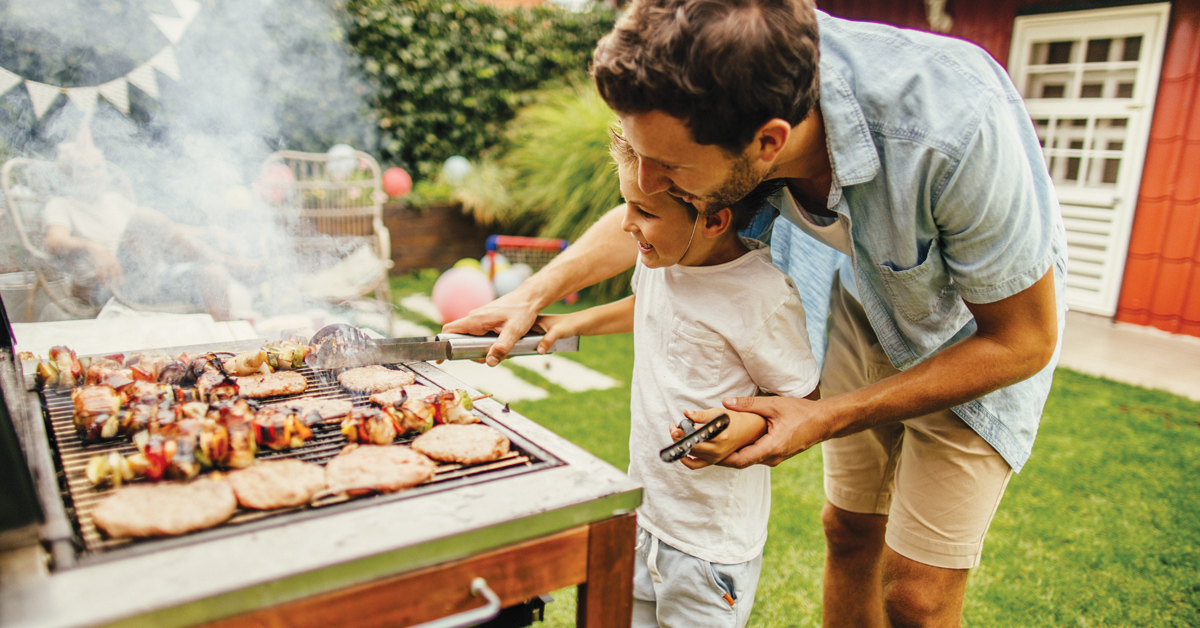Fired Up for Summer
Fired Up for Summer

Gathering around a firepit and grilling food outdoors are staples of summertime fun. But where there’s fire, there’s danger.
If you’re planning to hang out around a firepit or show off your barbeque skills at the grill this summer, make sure you’re following our safety tips.
Firepits and the law
The first question when it comes to firepits is, “Are firepits legal?”
The answer depends on where you live and what kind of firepit you are using. For instance, in the City of Buffalo, only controlled-flame gas-burning fire pits are permitted. Controlled-flame firepits limit the likelihood of an ember landing on a neighboring roof or tree and causing a fire.
More rural areas often permit “open” wood-burning pits, which cannot quickly be extinguished in the way that a gas firepit can. Where permitted, open-burn firepits often have restrictions about how close they can be to homes or structures.
To find out the legal status of fire pits in your area, contact your municipal government office.
Firepit safety
Safety is key, especially when dealing with fire. To prevent fire or burn injury, the U.S. Fire Administration and Federal Emergency Management Agency recommends the following:
-
Build your firepit at least three feet away from your house or anything that can burn. AAA recommends a distance of at least 10 feet.
-
Closely monitor children when the firepit is in use.
-
Cover wood-burning fires with a metal screen to keep sparks and embers from floating out.
-
Store matches and lighters away from children.
Outdoor grilling
Grilling season should be enjoyed with friends and family, but accidents can happen. Before you barbecue, take a few minutes to review grilling safety tips and ensure your equipment is working properly.
Safe barbecuing tips:
-
Before grilling, read and follow the owner's manual for the grill.
-
Place your grill at least 10 feet away from walls and deck railings to prevent fires from igniting buildings. Keep your grill away from decorations, such as hanging plants and umbrellas.
-
Never grill indoors or in confined areas; charcoal grills produce carbon monoxide fumes that are fatal in unventilated areas.
-
Keep a fire extinguisher nearby and know how to use it.
-
Never leave a grill burning unattended.
-
Grease can cause flare-up fires. Keep your grill clean by removing grease and fat build-up from the grill and grill trays.
-
If the flame on your grill goes out, turn the grill and gas off. Wait at least 15 minutes before relighting and always make sure your grill lid is open before igniting.
Grill maintenance and storage:
-
When setting up at the start of grilling season, check grill hoses for cracks, holes and blockages. Blockages caused by food drippings or insects can be cleared with a wire or pipe cleaner.
-
Run a soap solution (one-part liquid soap, one-part water) along hoses and at connections. If the solution bubbles, then there is a gas leak that needs repair.
-
Store propane tanks outside and away from your home. Always check to ensure that valves are turned off.
-
Learn more on grill maintenance here.
What your insurance covers:
Following the tips above may help prevent a firepit or grill fire from spreading to your home, but if a fire does occur, a standard homeowners policy typically covers the following:
-
Damage to the primary residence.
-
Damage to personal possessions, such as tables or lawn chairs.
-
Damage to insured structures on your property, such as sheds or gazebos.
-
Injuries to a guest, under the liability portion of the policy.
Keep your home and property safe with these tips. If you need home insurance, go with name you trust at AAA Insurance. Get a quote today at AAA.com/Insurance.